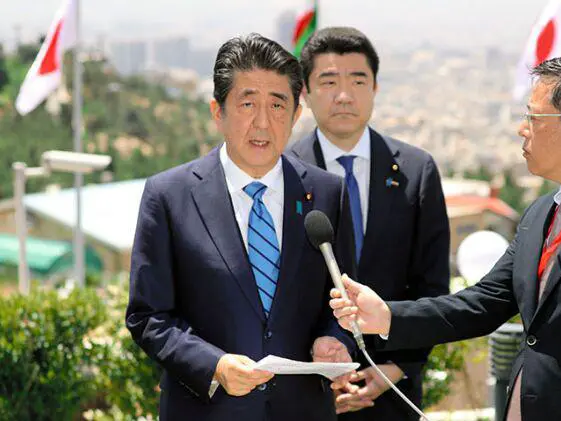If Israel's sitting Prime Minister Benjamin Netanyahu can get himself reelected for the third consecutive time in the upcoming elections, he would break a record set by legendary leader David Ben Gurion.
However, it is also very likely that Netanyahu could be dethroned by Isaac Herzog, leader of center-left Zionist Union.
Netanyahu, 65, was born in Tel Aviv, to historian Benzion Netanyahu, a member of the nationalistic Revisionist Zionism faction who supports a "greater Israel," or an entire Jewish country between the Mediterranean Sea in the west and the Jordan River in the east.
As a teen, his family moved to the United States, where he received education. He then returned to Israel to serve in an Israeli commando unit, then back to the United States to acquire degrees in architecture, business and political science at the Massachusetts Institute of Technology.
Netanyahu worked with Republican politicians in the United States, including former presidential candidate Mitt Romney. He also worked as a business consultant in the Boston Consulting Group. By then he had developed his neo-liberal economic outlook, supporting private ownership and advocating free market.
In 1976, his brother Jonathan died while commanding a Special Forces rescue operation to save Israeli hostages in Uganda. Following his brother's death, Netanyahu became increasingly involved in politics, working as a researcher on anti-terror issues and developing his hawkish views. In the 1980s, he served at the Israeli embassy in Washington and in 1984 he served as Israel's ambassador to the UN He authored several books by then on terrorism and about a future conflict between Israel and Iran.
He entered into Israeli politics as a Likud politician in the early 1990s, strongly opposing the 1993 Oslo Accords, an interim framework agreement providing Palestinians with self-governance. In 1996, amid a wave of terrorist attacks perpetrated by the Palestinians which killed hundreds of Israelis, Netanyahu was elected as prime minister for the first time, outrivaling Shimon Peres, the former president who went on to head the Labor party.
Despite Netanyahu's hawkish views against Israeli-Palestinian diplomatic ties, he negotiated with the Palestinian National Authority in 1998, yielding the Wye River Memorandum which implemented an agreement from 1995. He has declared his red lines: no withdrawal from the Golan Heights (which Israel occupied from Syria in 1967), no change in the status of Jerusalem and no negotiations with preconditions.
Netanyahu was defeated in 1999 by left-wing politician Ehud Barak. On the one hand, he made concessions to the Palestinians as party of the Wye River agreement, turning right-wing voters away from him. Left-wing voters saw him as a hawkish politician, trying to set differing sectors of Israelis against each other. One of his memorable quotes said left-wing Israelis "forgot what it means to be Jews."
After a brief retirement from political life, he served as Finance Minister in 2003 in Ariel Sharon's government. He was sharply criticized for cutting stipends for low-income families, extending privatization and liberalization reform policies. He left Sharon's government in 2005 following Sharon's disengagement plan from the Gaza Strip and served as head of the opposition until 2009, when he was elected to replace center-politician Ehud Olmert (replacing Sharon who suffered a stroke), who faced corruption charges.
In his second term as prime minister, between 2009 and 2013, Netanyahu focused mainly on Iran, stressing the risk a nuclear Iran poses to Israel, spending over 11 billion U.S. dollars preparing for potential military conflict with Iran, repeatedly insinuating a possible pre-emptive strike by Israel against Iranian nuclear facilities.
As for the Palestinians, in a speech in 2009, Netanyahu expressed his most dovish position regarding peace with the Palestinians, declaring that he supports a two-state solution. Recently Netanyahu seemed to try to backtrack from the statement, blaming Palestinians for the diplomatic dead-end.
He has since suspended a recent round of negotiations with the Palestinians (which took place between July 2013 and April 2014) following the establishment of the Palestinian Unity Government with Hamas. Since then Netanyahu took a stern approach against the Palestinian Authority, blaming it for inciting attacks against Israelis.
Palestinians attested that Netanyahu and his representatives laid out stern security demands in order to predetermine the talks for failure, all the while maintaining settlement construction in the West Bank and east Jerusalem as well as allocating funds for them.
Netanyahu continued to take a staunch approach against Palestinians in his third term as prime minister, decreasing cooperation between Israel and the Palestinian Authority and establishing nationalist legislation regarding the Jewish nature of Israel, in order to gain increased right-wing support.
He punished the Palestinian Authority by not allowing through tax funds collected on Israel's behalf, once the Palestinians decided to join the International Criminal Court in order to prosecute Israeli officials for war crimes. Netanyahu's move may sever 20 years of security coordination between the Israelis and the Palestinians.
In previous elections, Netanyahu had built for himself an image as a hawk who could take care of a deteriorating security situation amid the ongoing conflict with the Palestinians.
However, that has suffered negatively due to deterioration in the security status in Israel in the past few months, with militant attacks by Palestinians on Israelis in Jerusalem and the West Bank, as well as constant clashes between Palestinian protestors and Israeli security forces and sporadic attacks against Palestinians by Jews.
A turning point in the deteriorating security situation was the 50-day war with Hamas in Gaza, sending hundreds of thousands of Israelis into bomb shelters. Over 2,200 Palestinians died in what was known as Operation Protective Edge, the most substantial military campaign under Netanyahu's rule, with over 70 Israelis dead, mostly soldiers. Enditem
 简体中文
简体中文












